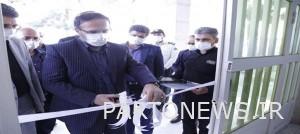Judiciary »The emphasis of the Chief Justice of Alborz Province on peace and reconciliation in litigation

According to the Alborz Justice Public Relations, the Meshkin Dasht Dispute Resolution Council building with three active legal branches was put into operation in the presence of the Alborz Justice Chief Justice, the Provincial Dispute Resolution Council, the Chief Justice and the Ferdis Prosecutor and local officials. Judicial services to the people of Meshkin Dasht will be possible without the need to go to Ferdis.
At the inauguration ceremony of the building, the Chief Justice of Alborz Province stated that the Dispute Resolution Council is an institution that was formed in accordance with the teachings of Islam and the order for peace.
Explaining the conditions of adjudication between the defendant and the plaintiff, Hossein Fazeli Herikandi emphasized: “Whatever is tried in the courts and tribunals to hear a case leading to a verdict still has no effect on the compromise between the parties, because each case has two parties and At least one side is dissatisfied with the outcome, but when a case leads to peace and reconciliation, both sides are satisfied.
He stated that the philosophy of establishing a Dispute Resolution Council is to reduce the number of people referring to the judiciary and trying to establish peace and reconciliation, and said: “Courts act by issuing a decision and a season of hostility through voting, but the reason for forming the council is compromise and reform.”
Referring to the views of the head of the judiciary on the important role of the Dispute Resolution Council, the Supreme Judicial Official of Alborz Province said: Graduate as much as possible to fulfill its inherent duty of compromise and negotiation to reach an agreement.
Emphasizing the need to support the Dispute Resolution Council by various institutions, he said: “Working in the Dispute Resolution Council and establishing peace among the people is in fact a kind of self-sacrifice and struggle, and this council needs the support of other bodies to be able to do its job.”
Fazeli Herikandi continued: “The judiciary also pays attention to this issue in proportion to its facilities, and during the visit of the head of the judiciary in January 1998, we had approvals in this regard, including allocating funds for building a dispute resolution council in Karaj and equipping it, which must be acknowledged.” For the tasks performed by this council and the needs of the Dispute Resolution Council, this amount, which is within the limits of the capacity of the judiciary, only meets its basic needs.

